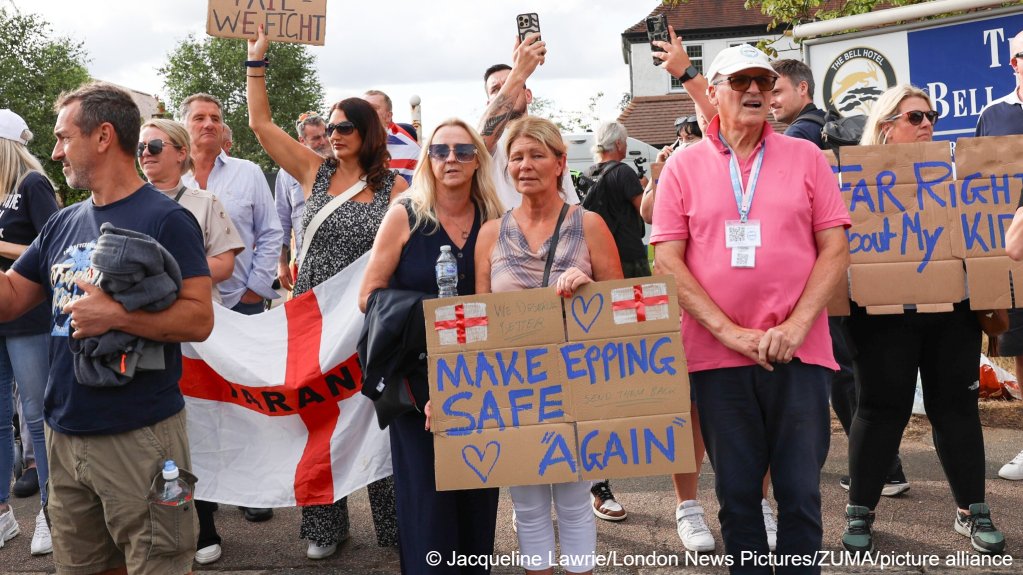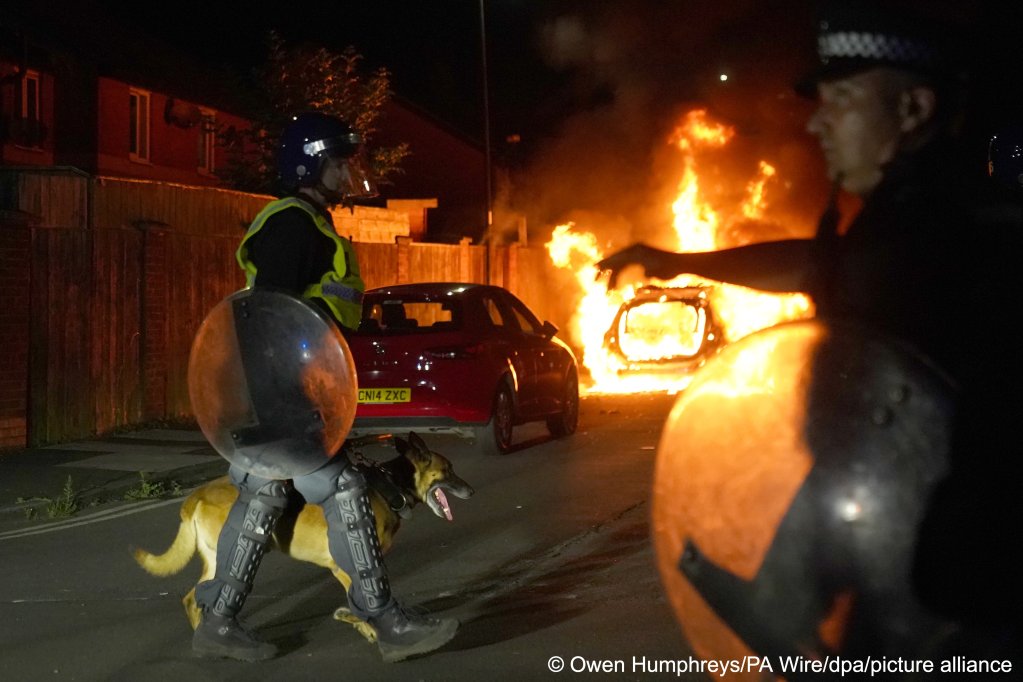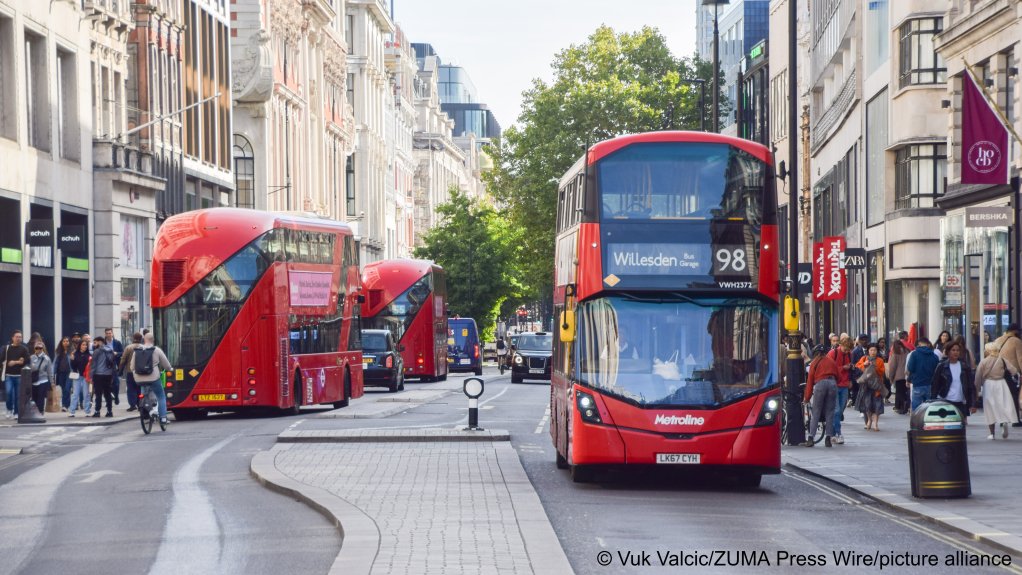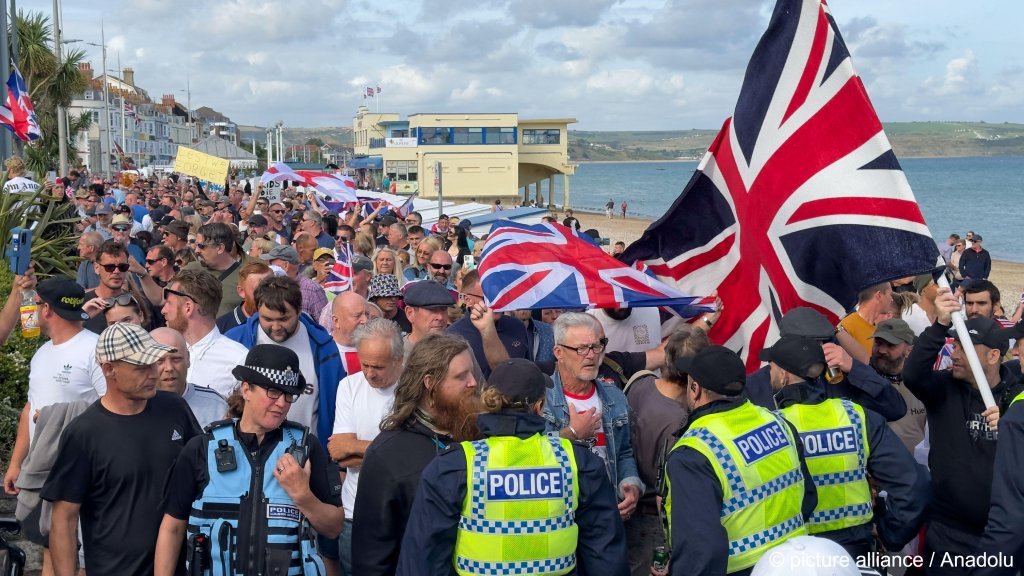British police have made a number of arrests following anti-migrant protests in the country this month, but are fears that the latest demonstrations could spark another summer of unrest, which followed the stabbing of three young girls last year, unfounded?
Anti-migrant protests that started in the middle of this month in the town of Epping, just outside of London continue. Some experts worry that the protests could escalate into widespread hostilities, reminiscent of the nationwide riots that broke out last summer, following the stabbing of three young girls at a dance class.
That crime was in fact carried out by a young man, convicted in January this year, who was born and grew up in Britain. However, soon after the stabbing, disinformation spread on social media, stating the perpetrator was a recently arrived migrant. Police moved quickly to dispell this notion, but the false news caused a wave of protests and riots that spread across the UK.
This July, protests that started in Epping have now spread to London’s Canary Wharf and in Manchester and the port of Dover. Demonstrations outside hotels used to house asylum seekers, as well as near the main port of arrival for cross-Channel migrants have taken place multiple times since the beginning of the month.
Reports from media outlets and counter racism groups such as Stand Up to Racism indicate that the actual number of protestors over the weekend in Epping numbered a few hundred, but the feeling of discontent being carried in the media carries its own momentum.
Epping
Protests erupted in Epping in mid‑July 2025, triggered by the arrest and court charge of a 38‑year‑old Ethiopian asylum seeker. He was reportedly charged with three counts of sexual assault, one count of inciting a girl to engage in sexual activity, and harassment without violence, following allegations that he attempted to kiss a 14‑year‑old girl.
Protestors gathered outside the Bell Hotel, which also serves as a temporary shelter for asylum seekers. While the initial gathering was peaceful, tensions began to mount when residents and far‑right activists joined forces outside the hotel.

Demonstrators clashed with the police and reportedly hurled eggs and bottles at officers, damaging squad cars. Riot squads were deployed, and eight officers were reportedly injured in the scuffles.
Subsequent demonstrations unfolded with people chanting slogans like "Save our kids," "Deport foreign criminals," and "Defend our girls," reported British media, like the BBC.
Spreading rumors and riots
Over the weekend, unverified information on social media suggested that asylum seekers were being moved from The Bell Hotel in Epping to a four-star hotel in London.The rumors prompted protests outside the Britannia International Hotel in Canary Wharf on Tuesday.
The local digital community publication Poplar London reported that local councillor Nathalie Bienfait of the Green Party organized a counter-demonstration to show solidarity with those seeking asylum.
"It was quite clear there were a lot of people outside the hotel already, and a lot of discussion online that was scaremongering and not showing compassion towards vulnerable people who’ve made dangerous journeys to get here," said Bienfait. She also posted a video on the platform X to explain why she believes it is "right to stand in solidarity with migrants, refugees and asylum seekers."
"I’m shocked at that level of aggression in Tower Hamlets, [the London borough where the hotel is situated] when Tower Hamlets was built on the shoulders of migrants," she added. As Beinfait points out, Tower Hamlets, like many other parts of London, has a long and illustrious history of welcoming and being enriched by migrant communities. It is situated in the east of the city, has always had a strong working-class character and is alongside the Thames, literally London's link to the outside world and the first place of arrival and often settlement for sailors, traders and migrants for centuries.
To counter the anti-migration protestors, Bienfait and a small group of activists stood with signs welcoming refugees, but were soon met with hostility. Far-right livestreamers were reported to have surrounded the group, with one man reportedly attempting to snatch their placards. Police escorted them away from the scene to chants from opposing protesters. Bienfait has since faced abuse online, including manipulated AI footage posted by far-right accounts, she says.
Despite the intimidation, Bienfait says she does not want to brand all protesters as racist, pointing instead to deep-rooted frustrations about government neglect and public service underfunding. However, she warned that "a handful of influencers" are shaping the national conversation around asylum seekers through coordinated disinformation campaigns.
A 'powder keg' of social tensions
The return of disinformation featuring migrants is fuelling concerns that the current street demonstrations may spark further protests and could escalate to a repeat of last year’s nationwide riots following the stabbing and killing of three young girls in Southport last year. Disinformation alleging that the suspect was a migrant and asylum seeker sparked anger and violence targeted at migrants. Mosques and hotels housing asylum seekers were set ablaze.
While such incidents remain isolated so far, new research suggests that a growing disconnect between communities is contributing to a spike in anti-migrant sentiment. The gap left by the lack of social interaction is filled by disinformation delivered by algorithms into the personal space occupied by mobile phones.

Jake Puddle, Senior Researcher at British Future and lead author of 'The State of Us' report, explained to InfoMigrants: "Many of the conditions from last summer’s riots are unchanged today. While Epping is a relatively prosperous area with less deprivation, we're seeing nationwide pressures that create vulnerability to unrest: pessimism about the state of the economy, the rapid spread of online hate, and grievances towards minority groups."
Puddle added: "So there is a risk that new incidents could trigger further unrest, as in Epping. It’s important to remain vigilant without being alarmist or stoking tensions."
According to The State of Us, a report published by the think tank British Future, three in ten adults, equivalent to about 15 million people, say they rarely or never have opportunities to meet people from different backgrounds.
Shrinking shared spaces and reduced opportunities for social contact are playing a key role in shaping attitudes towards migrants and asylum seekers, think the report's authors. Brittle community ties are leaving room for harmful narratives to take hold.
"We know that social contact, for instance between local people and new arrivals to a community, makes a real difference in reducing prejudice and building connections," Puddle said. "But big shifts in our society such as how we work and socialize, the decline of shared spaces in towns and cities, and how much time we spend online mean we have fewer chances to meet people from different backgrounds. That needs to change."
Economic anxiety aggravating grievances
The research, which includes interviews and polling conducted across the UK, also sheds light on how economic pressures are influencing public perceptions. Puddle says the cost-of-living crisis is exacerbating tensions, particularly in areas where asylum seekers are being temporarily housed in hotels. In some instances, the report found that this was done without consulting the community.
"Many people we spoke to in our research talked about cost-of-living pressures," Puddle explained. "This can lead to grievances if people perceive outsider-groups, such as asylum-seekers housed in local hotels, to be getting access to resources that they are not. Some of this is also deliberately fanned by disinformation."
One other reason is money--or the lack of it. Half of those featured in the study said they don’t always have enough money to go to places where they would meet other people. The research finds that those who "often" get to meet others from different backgrounds are significantly more likely to feel that people from different backgrounds get along in their local area.

Despite rising tensions, the study offers reasons for cautious optimism. According to British Future, many people in the UK still recognize the positive contributions migrants make to society and support the idea of Britain offering protection to refugees.
"There’s lots of hope in our recent study: most Britons feel that people get along well in their local neighborhood," said Puddle. "Immigration is a heated topic, but most people’s views aren’t black-and-white. They value migrants coming to work in the NHS (National Health Service) and public services, and they do want Britain to play a role in protecting refugees."
Still, many respondents expressed frustration with the way migration is being managed. A perceived lack of control over small boat crossings and the sudden appearance of asylum hotels in local areas — often without prior notice — were key points of concern.
Puddle argues that politicians have a responsibility to prevent racist and violent rhetoric from becoming mainstream, while also addressing legitimate concerns through dialog and policy.
"Leaders will need to engage in constructive debate about ways to support integration and create an orderly, fair and humane system," he said.
Read AlsoUK teens who lived through racist riots want change
Structured lifecycle of disinformation
The Nerve, a data analytics research agency released a report this week that uncovered the structure behind long-running disinformation campaigns in the UK that are often powered by far-right networks and global influencers.
Disinformation campaigns, backed by far-right networks and global influencers, prime online communities for hostility through narratives that are seeded in niche echo chambers, reinforced through repetition and community validation, stated the report. During a crisis or a single flashpoint, these narratives are ignited into flares of hate and violence.
The report, was released on the one year anniversary of the Southport riots that were triggered by the stabbing of three young girls in the town.
The groundwork for the riots and unrest, note the report's authors, had been laid long before the tragic stabbing. The Nerve analyzed over 27 million social media posts and included a nationally representative YouGov survey revealing how a crisis event served as a trigger for widespread unrest.
For months, far-right influencers, conspiracy forums, and hyper-partisan outlets had been seeding distrust toward migrants through emotionally charged stories and unverified allegations. These narratives gained traction in echo chambers on X (formerly Twitter), Facebook, YouTube, and TikTok, where algorithmic incentives rewarded engagement—particularly outrage—over accuracy.

Conspiracy influencers like Elon Musk and Andrew Tate played a central role in globalizing the discourse, linking domestic tensions to broader narratives about Western decline and migrant "invasions."
The report warns that the UK’s current regulatory response is insufficient. Laws like the Online Safety Act fail to tackle the systemic, structured manipulation of public discourse. By focusing only on content removal rather than the lifecycle of disinformation, policymakers risk missing the deeper, long-term dynamics fueling division and radicalization.
Parallel to this, the left-leaning British newspaper The Guardian also reported on Saturday (July 26) that two out of every five people arrested after participating in last summer’s riots had been previously reported to the police for domestic abuse. The Guardian secured police data under freedom of information (FoI) laws which indicate that aboout 41 percent of the 899 people arrested had previously been reported for crimes related to intimate partner violence.
For those arrested by one police force, this figure was as high as 68 percent, reported the paper.
Read AlsoUK riots: How far-right actors capitalized on public anger
